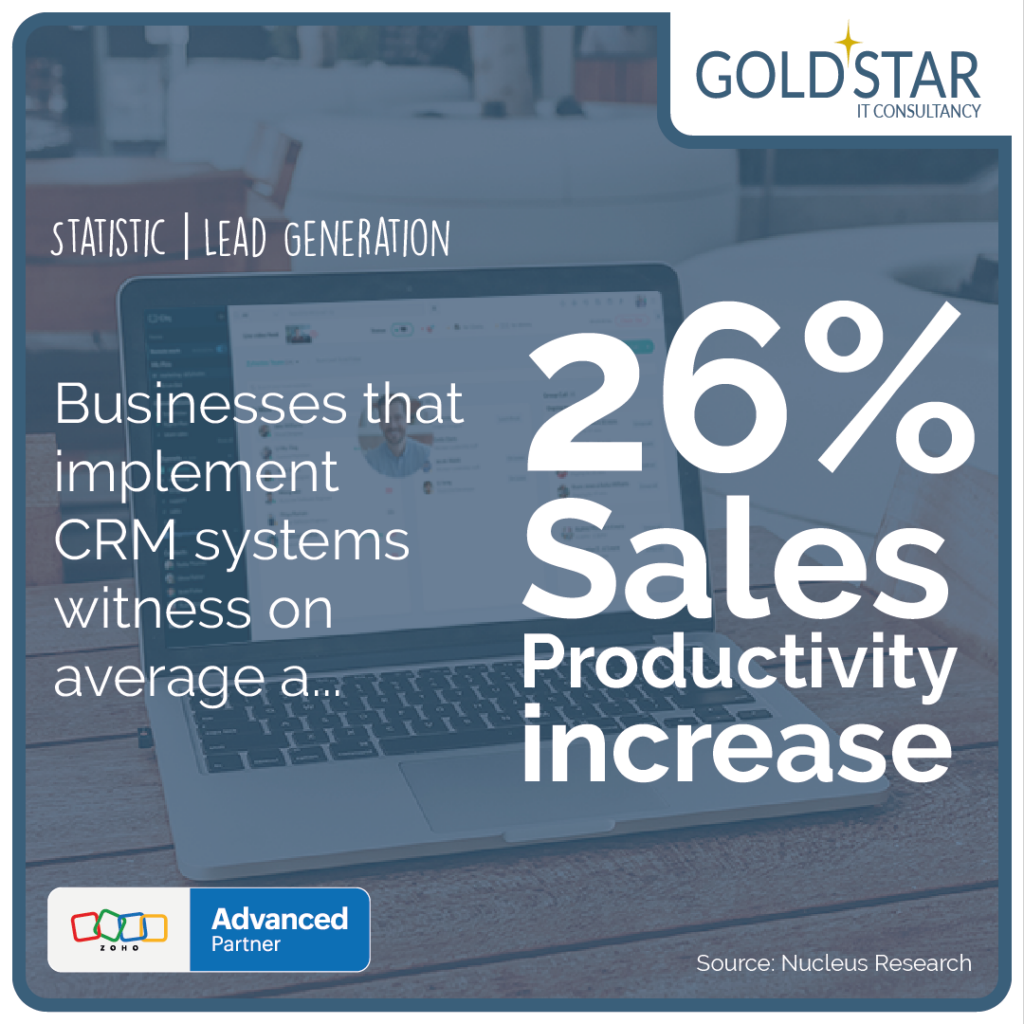Increase Sales Productivity with a CRM solution

How big is your sales team?
5 people, maybe 10? Let’s imagine somewhere in the middle, you have a dedicated sales team of 8. They are performing well but there is scope for growth – How can you increase sales productivity with a CRM solution?
According to Nucleus Research, businesses witness an average increase of 26.4% in sales productivity with CRM implementation.
To put this in perspective, for a sales team of eight, this equates to essentially adding two more team members. Imagine the real-world impact for your business.
Efficient lead generation stands as the cornerstone of success for sales-focused businesses. In this exploration, we delve into the transformative power of a well-integrated CRM system. Seeing how it can supercharge lead generation, from capturing and tracking leads to their effective conversion.
What is a ‘Lead’ in a CRM tool?
In the realm of Zoho CRM, a ‘Lead’ represents a potential customer who has shown interest in your products or services but has not yet progressed into a fully qualified opportunity.
Zoho CRM defines ‘Leads’ as the initial point of contact. It allows businesses to capture essential information such as contact details and interaction history. This information serves as the foundation for cultivating relationships and guiding leads through the sales pipeline.
In Zoho CRM, a lead evolves into a ‘Prospect’ or ‘Opportunity’. This happens as the engagement deepens, providing a systematic approach to managing and converting potential business opportunities into tangible results. Understanding the nuances of leads within Zoho CRM is key to maximising the potential of this powerful CRM tool.


The benefits of adding a CRM for a Sales team
In our introduction we reflected on the statistic of a 26.4% increase in productivity after adding a CRM. As we’ve said, that’s the equivalent of an average sales team of 8, employing 2 new staff members. Yet the CRM option will yield several substantial benefits:
| Cost-Efficiency | Implementing a CRM often comes at a fraction of the cost of hiring and onboarding new staff. It’s a more economical option, allowing businesses to allocate resources strategically. |
| Increased Productivity | The Nucleus Research statistic reveals a 26.4% increase in sales productivity with CRM implementation. This boost in efficiency can often surpass the contributions of additional staff, making the existing team more productive. |
| Enhanced Scalability | A CRM system provides scalability without the complexities of recruiting. As your business grows, the CRM can adapt to increased data, leads, and customer interactions, ensuring a smooth transition without the need for constant hiring. |
| Streamlined Processes | CRM systems streamline sales processes, from lead generation to conversion. Automation features reduce manual tasks, allowing your existing team to focus on high-value activities, thus maximising their impact |
| Data-Driven Decision-Making | CRM platforms offer valuable insights into customer behaviour, helping the sales team make informed decisions. This data-driven approach can be more effective than merely expanding the team, especially if the existing processes lack optimisation. |
| Improved Collaboration | A CRM fosters better collaboration among team members. Centralised data and communication channels ensure everyone is on the same page, leading to more cohesive and effective teamwork. |
| Reduced Onboarding Time | Onboarding new staff members takes time. Implementing a CRM requires training, but it’s often a quicker process than integrating new team members, allowing for faster implementation of improved sales strategies |
| Consistent Customer Experience | A CRM helps maintain consistency in customer interactions. Every team member, whether new or existing, can access the same customer data, ensuring a unified and positive customer experience. |
| Adaptability to Market Changes | In a dynamic market, the agility provided by a CRM can be invaluable. The system allows for swift adjustments to changing market conditions, providing a competitive edge without the need for constant recruitment. |
| Focus on Strategy | With a CRM handling routine tasks and data management, the sales team can redirect their efforts toward strategic initiatives, relationship-building, and high-impact sales activities, contributing to long-term business growth. |
In essence, incorporating a CRM into a sales team offers a comprehensive solution that not only enhances efficiency and productivity but also brings a host of benefits. Frequently these will surpass the advantages of adding new staff members.
The impact of a CRM solution on your sales team
Let’s revisit the initial statistic, where businesses experienced an average 26.4% increase in sales productivity with CRM implementation. We can see the profound impact a CRM solution can have on your sales team. This becomes particularly crucial when considered alongside with the challenge faced by 61% of marketers who identify lead generation as their top priority.
Choosing a CRM solution over expanding the sales force offers numerous advantages for businesses. The added benefits of a multi-user, cross-department CRM solution becomes obvious:
1. Efficiency Amplification
A CRM system acts as a force multiplier, amplifying the efficiency of your existing sales team without the need for immediate expansion. The streamlined processes, automation capabilities, and centralised data management significantly enhance their productivity.
2. Cost-Effective Scaling
Opting for a CRM solution is not just about increasing productivity; it’s a cost-effective means of scaling your operations. This technology investment often outweighs costs tied to recruiting and maintaining extra team members.
3. Data-Driven Decision-Making
A CRM empowers your sales team with data-driven insights. Informed decisions from comprehensive customer data will lead to more strategic approaches in interactions, sales, and business development.
4. Cross-Departmental Collaboration
Unlike the singular focus of adding more team members, a CRM solution fosters cross-departmental collaboration. Marketing, sales, and customer service teams can easily share and access information, creating a synchronised approach that positively impacts the entire customer journey.
5. Scalability Without Complexity
As your business grows, a CRM solution effortlessly scales with you. Your CRM solution’s adaptability ensures smooth growth despite increased data, leads, and customer interactions, avoiding operational complexities.
In essence, the choice between expanding your sales force and implementing a CRM should not be considered as a silo. It’s about embracing an approach that aligns with the modern demands of business. A multi-user, cross-department CRM solution emerges as a strategic investment that not only addresses the challenges of today but positions your business for enduring success in the ever-evolving landscape of tomorrow.
5 sales questions to consider…
If you’ve got this far you must be considering adding to your sales force or adding a CRM.
So, let’s get you thinking about which route is the best to take with 5 simple questions that many businesses without a CRM might struggle to answer.
Reach out to your team or try yourself – ask these questions. Their responses serve as a litmus test for your CRM’s effectiveness in fostering customer understanding.

- Lead Source Identification: Where are your leads primarily coming from?
Understanding the sources. Whether it’s through social media, website visits, referrals, or other channels. This will provide insights into the effectiveness of your marketing efforts and helps refine your lead generation strategy. - Lead Value Assessment: How valuable are your leads to your business?
Evaluate the quality and potential of leads in terms of their fit with your target audience and their likelihood of conversion. This assessment informs resource allocation and ensures a focus on high-value leads. - Lead Cost Analysis: What is the cost associated with acquiring and nurturing a lead until conversion?
Analysing the cost per lead helps in budget optimisation and ensures that your marketing and sales efforts are efficient and cost-effective. - Lead Conversion Rate: What percentage of leads successfully convert into customers? Monitoring the lead conversion rate provides insights into the effectiveness of your sales funnel. It helps identify potential bottlenecks and areas for improvement in your lead nurturing process.
- Lead Qualification Criteria: What criteria define a qualified lead for your business? Establishing clear qualification criteria ensures that your sales team focuses on leads with the highest potential for conversion. This enhances the efficiency of the sales process and improves overall lead quality.
The ease in which you answer these questions may provide insights into whether your company should be looking for personnel, or a CRM solution. For some businesses the best fit might be an increase in the sales force but in our experience (and statistics support) an investment in a CRM offers a far better ROI for the growth of any business.
The case for a CRM solution for your sales force
In regard to sales expansion, CRM implementation, and lead mastery, strategic decisions today pave the way for lasting business impact. Whether enlarging your sales force, embracing a CRM, or refining lead strategies, the relationship between these elements is key.
It’s more than processes or people; it’s creating an environment where team, technology, and customer interactions align in the right way for your business. Every business is unique so why not get in touch and we can chat about what your business really needs. As you take the next steps, remember: these decisions are not just investments; they help shape a business narrative and will help launch your business to the next level.
